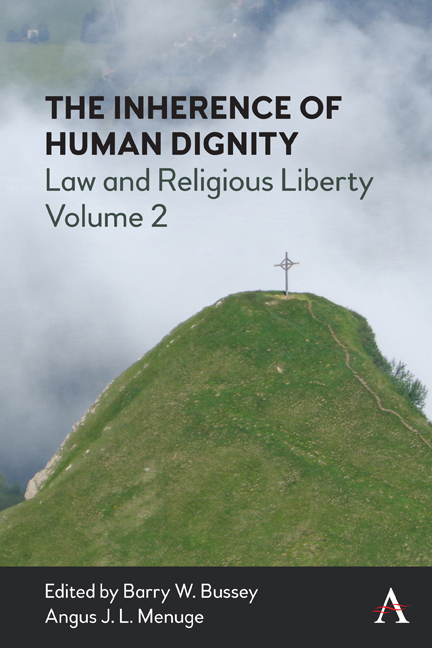Chapter Eight - Human Dignity Found in Religious Community
Published online by Cambridge University Press: 24 February 2022
Summary
Introduction
Jonathan Haidt, a social psychologist and professor of ethical leadership at New York University's Stern School of Business, notes that ‘you’ve got to look at the ways that religious beliefs work with religious practices to create a religious community’ (2012, 250). Since ‘religions are social facts’, says Haidt, religion ‘cannot be studied in lone individuals’ any more than a bee can be isolated from the hive (287). Rather, one must view religion as a collective phenomenon that has individual dimensions. As Emile Durkheim (1964 [1915]) observed, humans are homo duplex. We exist at two levels: ‘as an individual and as part of the larger society’ (225). We have a ‘profane’ realm (Haidt calls it the ‘chimp’ domain), where we are concerned with our day-to-day living, worrying about our wealth, health and reputation, but with a nagging sense of something more, of greater importance (Durkheim 1964 [1915], 226). Most of our time (90 per cent, according to Haidt) is spent in the profane. The other realm (10 per cent) is ‘higher’ – it is the ‘sacred’ – where the collective (Haidt calls it the ‘bee’ domain) emotions temporarily pull us away from the profane to the spiritual. Haidt suggests that religion has a ‘hive switch’ that causes us to switch back and forth (2012, 189–220).
We are, then, 90 per cent ‘chimp’ and 10 per cent ‘bee’. It is that 10 per cent I want to focus on in this chapter. The bee domain of human experience is often sidelined by the modern era's hypersensitivity to individual desire and disproportionate focus on satisfying individual expectations with little regard for communal obligations. Sometimes that focus is at the expense of the greater public good. This chapter argues that the communal religious experience of individuals forms a vital part of who they are: their being. My point is not that we are literally created by communal religious experience, but that it is only through such experience that we actualize our full potential as relational beings. So, by analogy, the person who wants to be a hockey player and has the potential to be one can exist even if the state bans hockey; but, in another sense, he cannot be a hockey player (actualize his potential) unless playing hockey is permitted.
- Type
- Chapter
- Information
- The Inherence of Human DignityLaw and Religious Liberty, Volume 2, pp. 115 - 146Publisher: Anthem PressPrint publication year: 2021



